
Ni Es lo Mismo Ni Es Igual is the eighth studio album recorded by Dominican singer-songwriter Juan Luis Guerra and his backup vocals 4–40. It was released by Karen Records on 15 December 1998 and distribuited by PolyGram Latino. It was Guerra's comeback album after four years of silence, out of the public eye and since his conversion to Christianity. It was his first studio album since Fogarate (1994). The album production and songwriting were done by Guerra. The album was supported by the release of four official singles: "Mi PC", "Palomita Blanca", "El Niagara en Bicicleta" and "La Hormiguita". Two singles were released as promotional singles: "Vale La Pena" and "Quisiera".

Aries is the ninth studio album by Mexican recording artist Luis Miguel. It was released by WEA Latina on 22 June 1993. After attaining commercial success in 1991 with his previous album, Romance, Luis Miguel decided to return to a style similar to his earlier work, featuring pop ballads and dance numbers with R&B influences. The record was produced by Miguel, who was assisted by Kiko Cibrian, Rudy Pérez, David Foster, and Juan Luis Guerra.
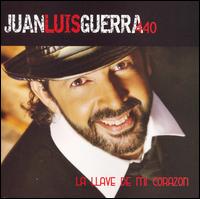
La Llave de Mi Corazón is the 10th studio album recorded by Dominican singer-songwriter Juan Luis Guerra, It was released by EMI Televisa Music on March 20, 2007. It was Guerra's first album to contain a songs in english since his 1994 recording of Fogarate. The album contains fusions of mambo and tropical rhythms that Guerra himself defined as "Mambo merengue". Its production and musical structure of album is based on merengue, bachata and salsa and encompasses elements of Blues, Son, Jazz, Mambo and Bossa Nova. The album was written, arranged and produced by Juan Luis Guerra and according to the artist is his most romantic album. It is composed of four merengues, two bachatas, three romantic songs and two salsas.

"Más Allá" is a song from Cuban-American singer-songwriter Gloria Estefan's sixth studio album, Abriendo Puertas (1995). The song was written by Kike Santander, who handled production alongside Gloria's husband Emilio Estefan. It was released as the second single from the album in December 1995. A Christmas bolero ballad, the song utilizes church bells and lyrically deals with selfless love. The song received positive reactions from music critics, who mostly praised the instruments. Commercially, it topped both the Billboard Hot Latin Songs and Latin Pop Airplay charts in the United States. Gloria Estefan performed the song live for Pope John Paul II at the Vatican and for then-US President Bill Clinton during a televised holiday special. Estefan re-recorded the song in 2020 for her fourteenth studio album Brazil305 and incorporated Brazilian music.

Bachata Rosa is the fifth studio album by Dominican singer-songwriter Juan Luis Guerra and his group 4.40. It was released on 11 December 1990, by Karen Records. It brought bachata music into the mainstream in the Dominican Republic and gave the genre an international audience. A Portuguese version of the record was released in 1992 under the title Romance Rosa; it was certified gold in Brazil. The album received a Grammy Award for Best Tropical Latin Album and two Lo Nuestro Awards for Tropical Album of the Year and Tropical Group of the Year.

"Si Tú Te Vas" is a song by Spanish singer Enrique Iglesias from his 1995 eponymous debut studio album. The song was co-written by Iglesias when he was 16 and his friend Roberto Morales with Rafael Pérez-Botija handling its production. It was released as the lead single from the album in October 1995. Iglesias recorded a demo of the song which was accepted by Guillermo Santiso, the president of Fonovisa Records, which led to Iglesias signing on with the company. A pop ballad, the song is about a man inspired by love and is afraid of a farewell. A music video for the song was filmed in New York and led to Iglesias being nominated for Best New Artist at the 1996 MTV Latino Awards.

Ojalá Que Llueva Café is the fourth studio album by Dominican singer-songwriter Juan Luis Guerra released in 1989 by Karen Records. It is considered one of his most emblematic and important albums. The album set the musical path for his later albums, re-formulating Dominican merengue and bachata music through the contemporary elements of pop, rock, salsa, or jazz. Incorporating socially conscious lyrics with danceable merengues and romantic-poetic bachatas, the album is considered one of the most important albums of his discography.

Fogaraté! is the seventh album of the famous Dominican songwriter and musician Juan Luis Guerra. It was released on July 19, 1994. The album mixed a variety of music genres including rural and flolklroic rots of merengue called "Perico Ripao" with elements of African soukus music and Tropical Music such as Reggae with the collaboration of African guitarist Diblo Dibala and Dominican accordionist Francisco Ulloa, along with Son, Bachata and Salsa. Also, the album features a particular, bachata-styled adaptation of the Lacrimosa movement from Mozart's Requiem Mass in D Minor and Guerra's first song fully in English "July 19". Exploring lyrics and themes about magical realism of Latin American literature and commenting on the politics of the Caribbean, for many fans and critics, Fogaraté! is one of his most musically complex album.
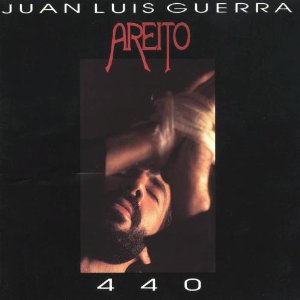
Areíto is the sixth album by Juan Luis Guerra with his band 440, released on 8 December 1992, by Karem Records. The album, meant to be a tribute to the indigenous tribes of the Dominican Republic, is named after a dance that the aboriginal inhabitants of the Greater Antilles (Taínos) accompanied with songs during their festivals and religious rites. The album contains twelve tracks including "Cuando te Beso", interpret by Santo Domingo Philharmonic Orchestra. Congolese musician Diblo Dibala played guitar on the song "El Costo de la Vida", which was a Spanish cover of his own soukous song "Kimia Eve", while the last track on the album, "Naboria daca, mayanimacaná", is sung in Arawak, the language of the Taíno people. Areíto was originally set to be released in early April 1992, but was first delayed to the end of October 1992 and was finally released on 8 December 1992.

"Mi PC" is a song by Dominican Republic singer-songwriter Juan Luis Guerra and his band 4-40 from his eighth studio album, Ni Es lo Mismo Ni Es Igual (1998). The song was released as the lead single from the album in November 1998 by Karen Records. The song was written and produced by Guerra. It is a pop merengue track in which Guerra uses computer terminology to narrate a love story. "Mi PC" was met with positive reactions from music critics who found the lyrics to be clever and its music catchy.

Grandes Éxitos de Juan Luis Guerra y 440 or simply Grandes Éxitos is a compilation album of Dominican singer-songwriter Juan Luis Guerra, and his band 440 released in July 1995 by Karem Records. It contained Guerra's fifteen biggest hits from 1988 to 1994 on the original version and from the albums Mudanza y Acarreo(1985) to Fogarate! (1994) on the international versions. The compilation receive positive reviews by the critics.
The Dominican singer, songwriter and producer Juan Luis Guerra has released 14 studio albums, two live albums and forty-eight singles. He is one of the best selling Latin artist of all time with more 30 millions of records worldwide. He made his debut with his first studio album Soplando, released in 1984. He later released his second studio album in 1985, Mundanza y Acarreo which was his first national success and marked his first entry at the US Billboard Charts at number seventeen on Billboard Tropical Charts. In 1987, his third studio album Mientras Más Lo Pienso...Tú become his first work to gain international attention in countries such as Venezuela and Puerto Rico. Between this last two albums, it sold over two million copies worldwide.

"No Sé Olvidar" is a song written by Kike Santander and performed by Mexican recording artist Alejandro Fernández. It was co-produced by Santander and Emilio Estefan and was released as the third single from Me Estoy Enamorando by Sony Music Mexico in 1997. The song is a bolero-pop ballad with ranchera influences and portrays the singer desperately trying to forget his lover. A music video was made for the track which features Fernández hopelessly attempting to not remember his lover only to slowly delve into insanity. It received a nomination for Video of the Year at the 1998 Lo Nuestro Awards.

"Viviré" is a song by Dominican Republic singer-songwriter Juan Luis Guerra released as the second single for his album Fogaraté (1994). It is a Spanish-language adaptation of "Vivi" by Congolese musician Papa Wemba with Guerra writing the song in Spanish. It became his first song to reach number-one on the Billboard Latin Pop Airplay in 1994. At the 1995 Latin Billboard Music Awards, "Viviré" won Tropical/Salsa Song of the Year. It was recognized as one best-performing Latin songs of the year at the 1996 BMI Latin Awards. The music video for the song was directed by Gustavo Garzón and received a nomination for Video of the Year at the 1995 Lo Nuestro Awards. On the review of the album for the Miami Herald, Fernando Gonzalez called the song "the best of the lot". A writer for Music & Media described the track as a Cuban son.
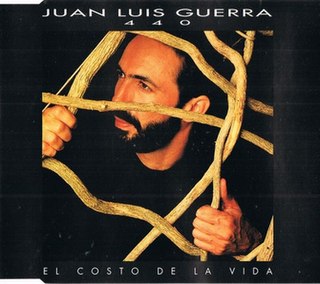
"El Costo de la Vida" is a song by Dominican Republic singer-songwriter Juan Luis Guerra from his sixth studio album, Areíto (1992). The song was released as the album's third single in 1992 by Karen Records. It is a Spanish-language adaptation of soukous song "Kimia Eve" composed by Diblo Dibala. The song features Dibala on the guitar and is performed by Guerra as a merengue number. The lyrics to the song provides a social commentary to the rising cost of living, while the artist denounces the dislevel of socioeconomics as well as political corruptions in Latin America. He also references the racial identities of Latin America.

"Bachata Rosa" is a song by Dominican Republic singer-songwriter Juan Luis Guerra released in 1991 and served as the lead seventh and final from his fifth studio album Bachata Rosa (1990). Along with Estrellitas y Duendes and Como Abeja Al Panal, is one of Guerra's first international hits and helped to contribute to the bachata sophistication and have recognition in Latin America and Europe. The track was a commercial success, toping the airplay charts in Mexico and was the fourth single of the album to peak insade of the top 10 at the US Hot Latin Tracks.
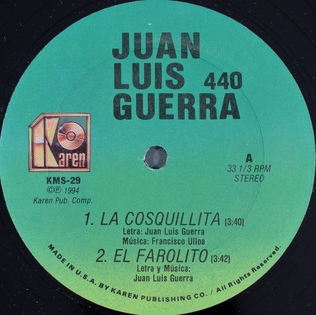
La Cosquillita is the lead single of the seventh studio album Fogarate! by dominican superstar Juan Luis Guerra. It was released on June 21, 1994 by Karen Records. The rural merengue track was written and produced with the Dominican accordionist Francisco Ulloa and his band. About the success of the track, Guerra stated "With the `perico ripiao' we are doing the same thing that we did with the `bachata,' breaking down the barriers that prevent it from reaching all of Dominican society, and then exporting it". The song became Guerra's first number-one hit in his native Dominican Republic; and became a top-ten hit in Spain, Venezuela and the US Hot Latin Songs chart.
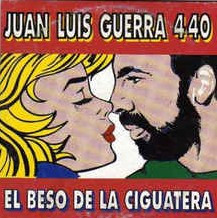
El Beso de la Ciguatera is a song by Dominican Republic singer-songwriter Juan Luis Guerra released as the third single for his album Fogarate (1994) with the collaboration of Diblo Dibala. The song was released in January 23, 1995 by Karen Records. The track encompasses merengue with soukus. The song was a recipient of a Broadcast Music, Inc. (BMI) Latin Award in 1996. Commercially, it reached the top ten on the Billboard Hot Latin Songs and Tropical Airplay charts in the United States. It also received moderate airplay in Europe.

"Lacrimosa" is a song recorded by Dominican singer Juan Luis Guerra for his seventh studio album, Fogarate (1994), included as its seventh track. It was released to radio stations in Europe in 1994 and the United States in 1995 by Karen Records as a promotional single, following "Los Pajaritos". The track is a bachata that attempts an interpretation of Mozart's Requiem.
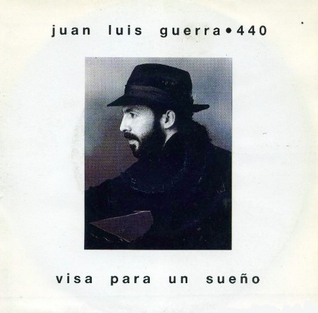
Visa Para Un Sueño(English: Visa for a dream) is the third single by Dominican artist Juan Luis Guerra and his band 440 from their fourth studio album Ojalá Que Llueva Café. Initially released by Karen Records in the Dominican Republic in 1989, it was released a year later in Spain. The track is a merengue providing a social commentary about the difficulties of obtaining a United States visa order to find work, better living conditions, and escape the poverty of third world countries, as well as being about the state of mind that many Dominicans have. The track was inspired by the illegal trips many Dominicans take to Puerto Rico every year to find better living and working conditions.















